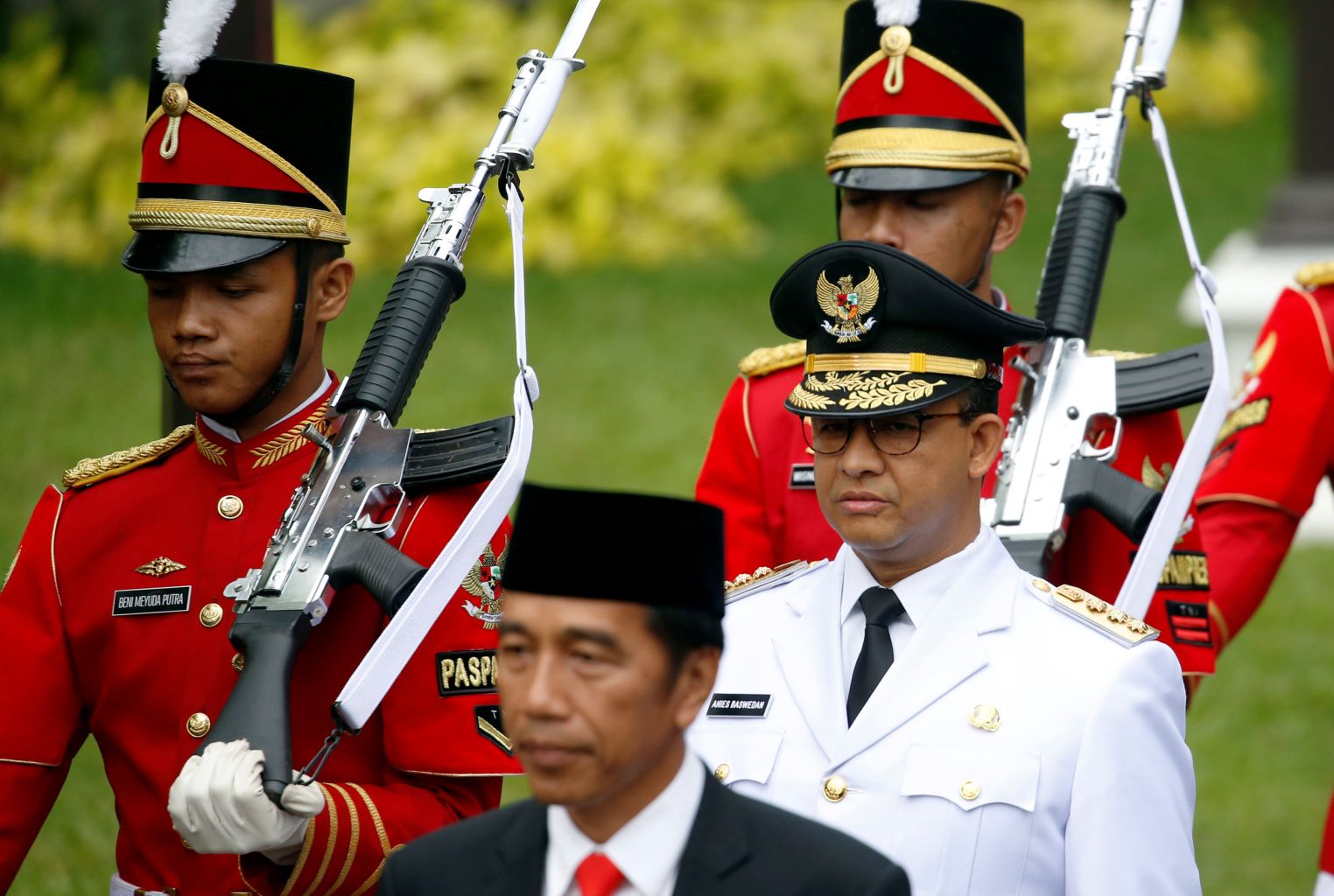Jakarta governor Anies defends populist policies amid pushback
Sign up now: Get insights on Asia's fast-moving developments

Presidential guards walk with Indonesia President Joko Widodo (left) and Jakarta Governor Anies Baswedan.
PHOTO: REUTERS
Follow topic:
JAKARTA (THE JAKARTA POST/ASIA NEWS NETWORK) - Jakarta Governor Anies Baswedan is seeing a pushback against some of his populist policies three months into his tenure amid claims from his critics that they are harming the capital.
After the police and other parties expressed their objections over a new traffic arrangement in Tanah Abang, Central Jakarta, members of opposition parties at the Jakarta City Council have rallied support to interpellate the administration for the road closure, which has reportedly worsened congestion in the area.
Councillors of the Indonesian Democratic Party of Struggle (PDI-P) and the Nasdem Party, who initiated the move, said Anies had violated a set of regulations in closing the Jalan Jati Baru Raya road near Tanah Abang for street vendors. They said the regulations include a bylaw that prohibit vendors from selling their goods on streets and sidewalks and another law on traffic and road transportation.
They also confronted the former education minister for re-opening the National Monument Square, or Monas, to religious gatherings, arguing that the decision contradicted a higher regulation issued by the central government which stipulates that the area should remain a "neutral" zone.
Anies responded by insisting that his policies had strong legal ground and were intended to benefit Jakarta residents.
"What we have done is for Jakartans. We want the city to belong to all its residents, not only some of them," he said at City Hall on Wednesday (Jan 24).
After being dismissed from his post in President Joko Widodo's Cabinet in 2016, Anies was nominated to run in the Jakarta gubernatorial election by the Gerindra Party and the Prosperous Justice Party.
Riding on the wave of Islamic conservatism sweeping across the country, he won the election from incumbent Basuki Tjahaja Purnama, better known as Ahok, a close ally of the president and who was supported by the PDI-P and Nasdem.
While he has struggled to realise his flagship programs, Anies has spent the first 100 days of his tenure by revoking policies issued by Ahok, especially those that had been criticised for being elitist.
Aside from the Tanah Abang road closure and the re-opening of Monas, Anies has also revoked a motorcycle ban on one of the city's main thoroughfares, a move which had been previously criticised as discriminatory toward motorcyclists.
As he gains both praise and ire for the policy reversals, his popularity among voters continues to climb. He has even been touted as a strong contender to run against the president in the 2019 election.
A survey released by Indo Barometer in December revealed that Anies was the third most popular presidential candidate, after Joko and Gerindra Party chairman Prabowo Soebianto.
Observers say Anies' controversial policies have only contributed to his rising popularity, regardless of the policies' impact on the city and its residents.
Defending Anies, City Council Deputy Speaker Muhammad Taufik from the Gerindra Party said the governor had clearly shown his support for the poor, who make up the majority of the capital's population.
"You can see how relieved the street vendors in Tanah Abang are after (the) new policy," Taufik said.
The previous administration had regularly conducted raids and seized the goods of vendors who violated the bylaw.
Indonesian Institute of Sciences (LIPI) political analyst Siti Zuhro said the interpellation plan demonstrated Anies' failure to maintain a good relationship with his legislative partners.
"If (he had) discussed the policies with the council before introducing them to the public, there would be no interpellation," she said.

